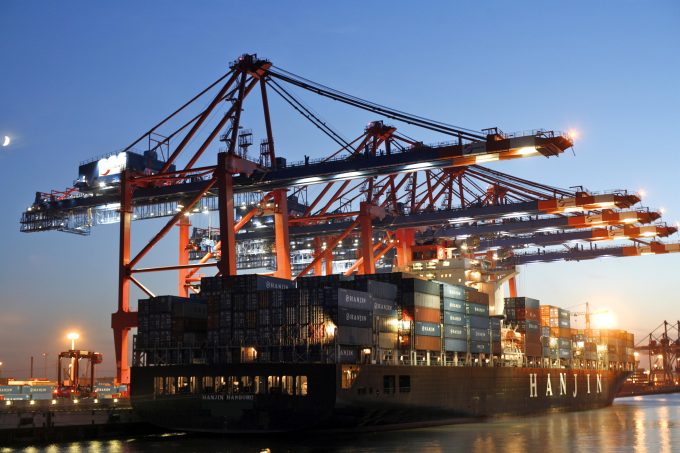Slow steaming not the way to reduce emissions, 'check the ship's systems'
Despite being highlighted by the International Maritime Organization’s carbon intensity indicator (CII) index, slow steaming ...
TFII: SOLID AS USUALMAERSK: WEAKENINGF: FALLING OFF A CLIFFAAPL: 'BOTTLENECK IN MAINLAND CHINA'AAPL: CHINA TRENDSDHL: GROWTH CAPEXR: ANOTHER SOLID DELIVERYMFT: HERE COMES THE FALLDSV: LOOK AT SCHENKER PERFORMANCEUPS: A WAVE OF DOWNGRADES DSV: BARGAIN BINKNX: EARNINGS OUTODFL: RISING AND FALLING AND THEN RISING
TFII: SOLID AS USUALMAERSK: WEAKENINGF: FALLING OFF A CLIFFAAPL: 'BOTTLENECK IN MAINLAND CHINA'AAPL: CHINA TRENDSDHL: GROWTH CAPEXR: ANOTHER SOLID DELIVERYMFT: HERE COMES THE FALLDSV: LOOK AT SCHENKER PERFORMANCEUPS: A WAVE OF DOWNGRADES DSV: BARGAIN BINKNX: EARNINGS OUTODFL: RISING AND FALLING AND THEN RISING

Following Korean carrier Hanjin offering express container shipping services on two major tradelanes, industry analyst Alphaliner has questioned the viability of abandoning slow-steaming.
It says that, in theory, with bunker prices below $200 per tonne since last November, the cost of operating fewer ships at higher speeds should be lower than the alternative of deploying additional vessels under slow-steaming conditions.
It calculated that by increasing the average speed of a transpacific loop by 2-5 knots a carrier could shave a week off the rotation, saving the cost of one ship on the route, and there would also be a saving in the “dead time” of containers aboard the vessel, reducing container leasing costs. Additionally, one less ship on a loop would bring a cumulative reduction in pooled port costs and dues.
However, said Alphaliner: “Speeding up vessels, shortening the rotation of a typical China to US west coast loop from six to five weeks, would increase bunker consumption by about 30-50 tonnes per day per ship.
“At the current price of $170 per tonne, and with 70% of [total] voyage time spent at sea, this would result in additional bunker costs of about $18,000-$30,000 per day.”
The analyst said that under “normal conditions”, that additional fuel-spend would be lower than the cost of chartering an extra ship and additional leasing fees for containers on the longer rotation.
But, it said, current conditions are far from normal.
Charter rates are at all-time lows, with the daily hire market rate for an 8,000 teu ship now less than $10,000 – a massive decline from the 2011 peak of $50,000 – and lease rates for containers are just $0.30 a day or less.
It said with ship rental and equipment costs at unprecedented depressed levels, carriers were still finding it cheaper to deploy extra vessels and slow-steam.
The only thing slow-steaming cannot address is the potential commercial benefits of faster transit times in the market.
The Loadstar has repeatedly reported shippers claiming they would be prepared to pay extra for express services, although carriers continue to doubt this, and many point to the failure of the Daily Maersk product to attract premium-rate paying cargo.
However, encouraged by the success of US carrier Matson’s express 10-day transit service between China and the US west coast, Hanjin has announced that it will soon launch an 11-day express service on the route.
“If demand for such express services were to increase and, more importantly, if shippers show a willingness to pay rate premiums for express services, more carriers could be prompted to increase sailing speeds,” said Alphaliner.
Comment on this article